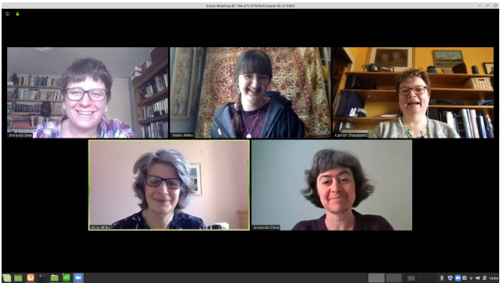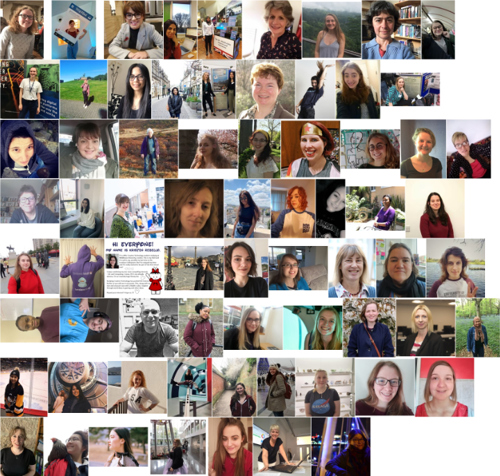Dr Hannah Dee’s report on the first virtual BCSWomen Lovelace Colloquium, 8th April 2020
21 April 2020
On April 8th 2020 we held the 13th BCSWomen Lovelace Colloquium for undergraduate and MSc women in computing. This was hosted by the University of Stirling, with support from the University of Glasgow. We really wanted to get together, as we have every year since 2008, and celebrate the great work being done by women in computing. We also really wanted to visit the beautiful Stirling campus and get shown around Stirling by the local team.
But... COVID19 happened. The organising committee (Helen Miles, Carron Shankland, Alice Miller, Amanda Clare and me) met via Skype on March 10th and agreed that we had to either cancel, or pull off an online conference with 4 weeks notice. Challenge accepted! With extensive support from the University of Stirling’s educational technologist Ros Walker we tried out all sorts of online systems for delivering talks to attendees, holding Q&A sessions, engaging with each other socially, and most importantly enabling students to show off their own work in poster contests.

[caption: this is how you organise a socially distant conference]
The setup we went for involved two parallel systems:
- Canvas, which is a virtual learning environment managed by Stirling which enabled us to have the talks recorded and cast in advance. This held talks, abstracts, and programme information.
- Discord, a live chat (voice, text and video) system which is free to use and popular with gamers, to manage the dynamic chat-based aspects of the conference. This held poster sessions, talk Q&As, panel discussions and even the pre-event ice-breaker quiz. Vitally for us the Discord platform allows users to program “bots”, so I wrote a few bots to welcome people to the server and to create channels for all the poster presenters; in this way, every poster presenter had their own voice chat and text chat channels to monitor and manage for questions and discussions.
Over 200 people signed up online, dipping in and out during the day. The largest number of people we had online the Discord Server at any one time was about 120, and this was during the poster contest. From an initial 132 poster abstract submissions we ended up with 45 poster presenters on the day, which is pretty good. A lot of students have had to manage moving house (in many cases moving country) between submitting their abstract and presenting a poster, on top of the stress of uncertainty about assessment, jobs and futures that come from studying and graduating during COVID19. I am always impressed by the students who show up to the Lovelace, but this year, they were even more impressive than usual.

Talks and posters
In the Lovelace Colloquium we usually have a small number of fairly lengthy talks, covering technical and advice-style presentations; our aim is to give a small sample but a wide range of talks and show that there are lots of different ways to be a successful woman in tech. This year we went for more talks, of shorter duration (as these work better online). This change was well received by the attendees.
We have kept the talks up, so if you would like to watch any of the talks, here are the links. The intros are under 10 minutes and the rest all under 20 minutes.
- Welcome, from Helen Miles of Aberystwyth University
- And a short introductory talk from Muffy Calder of the University of Glasgow
- Savi Majaraj, University of Stirling “Controlling epidemic spread by social distancing: Do it well or not at all”
- Lovisa Sundin, University of Glasgow “3 concepts to make you fall in love with Computer Science again...”
- Vicky Brock, Vistalworks “Life and learning as a tech entrepreneur”
- Ros Walker, University of Stirling “Being a learning technologist during COVID-19”
- Jess Enright, University of Glasgow “Changing graphs to stop disease”
- Sharon Moore, IBM, BCSWomen and SWIT: “Words of Wisdom”
Poster contest results
- First Year & Foundation year students – 1st place goes to Melanie Cope Manchester Metropolitan University for “Help, a Robot Took my Job!” with 2nd place going to Francesca Mirandola of the University of Stirling for “A new chapter for humanity”
- Best second year poster contest (featuring students on industrial year). First prize goes to Amy Pajak of the University of Birmingham ““Big Data is Watching You”: Using AI to Detect and Track infectious disease outbreaks” and 2nd place goes to Leah Fluegge of Sheffield Hallam University “Up in the cloud”
- For the final year students, first prize goes to Millie McQuillin Durham University with “Pedestrian Visual Attention Detection by Gaze-Following and Saliency Estimation” and 2nd place went to Rebecca McGowan of Edinburgh Napier University with “Formal Grammars in Procedural Game Generation”
- In the MSc contest, first place was secured by Kristen Rebello Middlesex University, London with a poster on “RUBIK REMOTE”; Second place went to Janet Leparteleg Lancaster University for her poster”AI, AINT I A WOMAN?”
- People’s Choice, voted for by attendees. 1st: Bridget Meade University of Stirling for “Next Day Delivery Healthcare” and 2nd: Yuqian Sun Goldsmiths, University of London for “ReBo: The possibilities of emotional AI chatbot”
If you’d like to read any of the winning posters, they can all be found online here in both PNG and PDF format
Sponsors
As ever we have been supported by a lot of people, including corporate sponsorship which really helps us pull the event together. This year we have to thank:
Microsoft – Silver Sponsor and also JP Morgan, STFC, Scott Logic, BCSWomen, GitHub Education, Northrop Grumman and Whitbread.
We had quite a lot of presence from sponsors at the online event which was great.













